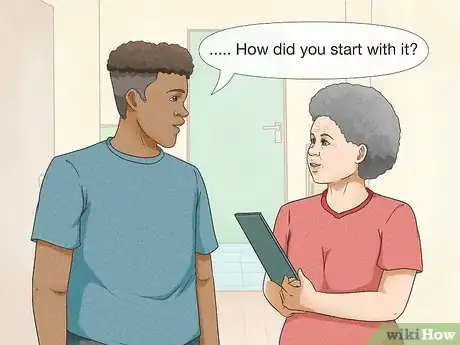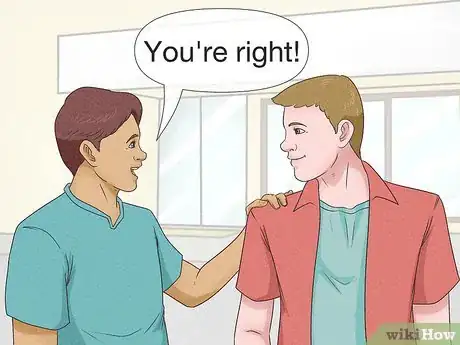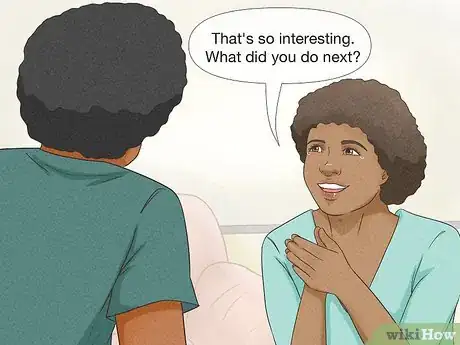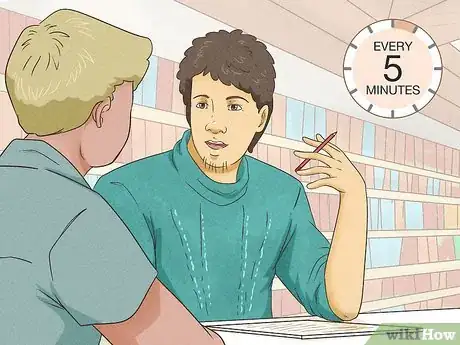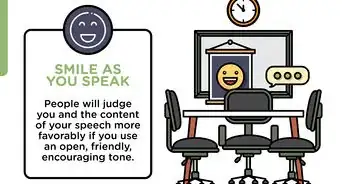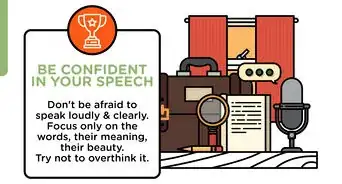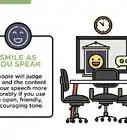This article was co-authored by Patrick Muñoz and by wikiHow staff writer, Hannah Madden. Patrick is an internationally recognized Voice & Speech Coach, focusing on public speaking, vocal power, accent and dialects, accent reduction, voiceover, acting and speech therapy. He has worked with clients such as Penelope Cruz, Eva Longoria, and Roselyn Sanchez. He was voted LA's Favorite Voice and Dialect Coach by BACKSTAGE, is the voice and speech coach for Disney and Turner Classic Movies, and is a member of Voice and Speech Trainers Association.
There are 8 references cited in this article, which can be found at the bottom of the page.
This article has been viewed 121,761 times.
Being a naturally quiet person isn’t a bad thing, but there may come a time that you’d like to speak up a little more to make your voice heard. As with most things, holding a conversation is a skill that you can get better at with practice. With a little patience and some hard work, you can become comfortable talking with people one-on-one or in large groups.
Steps
Expert Q&A
-
QuestionHow can I talk more confidently?
 Patrick MuñozPatrick is an internationally recognized Voice & Speech Coach, focusing on public speaking, vocal power, accent and dialects, accent reduction, voiceover, acting and speech therapy. He has worked with clients such as Penelope Cruz, Eva Longoria, and Roselyn Sanchez. He was voted LA's Favorite Voice and Dialect Coach by BACKSTAGE, is the voice and speech coach for Disney and Turner Classic Movies, and is a member of Voice and Speech Trainers Association.
Patrick MuñozPatrick is an internationally recognized Voice & Speech Coach, focusing on public speaking, vocal power, accent and dialects, accent reduction, voiceover, acting and speech therapy. He has worked with clients such as Penelope Cruz, Eva Longoria, and Roselyn Sanchez. He was voted LA's Favorite Voice and Dialect Coach by BACKSTAGE, is the voice and speech coach for Disney and Turner Classic Movies, and is a member of Voice and Speech Trainers Association.
Public Speaking Coach If you're naturally very quiet, it's important to develop your voice. For instance, you might work on tongue twisters, read poetry out loud, or take an improv class. If you're struggling to do this on your own, it can be very helpful to work with a speech coach or voice therapist.
If you're naturally very quiet, it's important to develop your voice. For instance, you might work on tongue twisters, read poetry out loud, or take an improv class. If you're struggling to do this on your own, it can be very helpful to work with a speech coach or voice therapist. -
QuestionHow do you stay calm when doing a speech?
 wikiHow Staff EditorThis answer was written by one of our trained team of researchers who validated it for accuracy and comprehensiveness.
wikiHow Staff EditorThis answer was written by one of our trained team of researchers who validated it for accuracy and comprehensiveness.
Staff Answer wikiHow Staff EditorStaff AnswerTry practicing a lot at home with your friends and family members. Before you get up to do your speech, take a deep breath and remind yourself that you know what you're doing. Before you know it, you'll be up on stage receiving a round of applause!
wikiHow Staff EditorStaff AnswerTry practicing a lot at home with your friends and family members. Before you get up to do your speech, take a deep breath and remind yourself that you know what you're doing. Before you know it, you'll be up on stage receiving a round of applause! -
QuestionHow do I stop myself from regretting everything when I talk?
 Community AnswerThe best thing that you can do is to remind yourself that the past is in the past and you need to move forward. Think about what you regretted saying and decide if you need to find a way to avoid repeating the same type of thing. If it really wasn't anything inappropriate, etc., then stop blaming yourself and focus on what you did add to the conversation.
Community AnswerThe best thing that you can do is to remind yourself that the past is in the past and you need to move forward. Think about what you regretted saying and decide if you need to find a way to avoid repeating the same type of thing. If it really wasn't anything inappropriate, etc., then stop blaming yourself and focus on what you did add to the conversation.
References
- ↑ https://www.businessinsider.com/how-to-keep-a-conversation-going-2011-1
- ↑ https://www.helpguide.org/articles/relationships-communication/dealing-with-loneliness-and-shyness.htm
- ↑ https://psychcentral.com/blog/7-ways-to-overcome-shyness-and-social-anxiety#3
- ↑ https://www.helpguide.org/articles/relationships-communication/dealing-with-loneliness-and-shyness.htm
- ↑ https://www.psychologytoday.com/us/blog/fulfillment-any-age/201712/10-must-know-tips-making-better-conversations
- ↑ http://www.succeedsocially.com/quiet
- ↑ https://www.succeedsocially.com/groupconversations
- ↑ https://www.helpguide.org/articles/relationships-communication/dealing-with-loneliness-and-shyness.htm
- ↑ https://www.businessinsider.com/how-to-keep-a-conversation-going-2011-1
- ↑ https://www.helpguide.org/articles/relationships-communication/dealing-with-loneliness-and-shyness.htm
- ↑ https://www.succeedsocially.com/quiet
- ↑ https://www.psychologytoday.com/us/blog/fulfillment-any-age/201712/10-must-know-tips-making-better-conversations
- ↑ https://psychcentral.com/blog/7-ways-to-overcome-shyness-and-social-anxiety#2
About This Article
Being a naturally quiet person can be challenging, especially when you want to join in the conversation, but with patience and practice, you can find your voice. When you’re speaking with other people, listen closely to what they have to say and ask follow up questions. You can also make small comments or exclamations, especially in larger group conversations. For example, if you agree with something say “Yeah” or “You’re right” instead of simply smiling or nodding your head. If the thought of saying anything at all makes you anxious, then give yourself a brief pep talk ahead of time. Remind yourself that you’re knowledgable and have something to contribute. You can even practice talking in less-stressful situations. For instance, set a goal to talk to 1 new person every day, like saying “thank you’ to a grocery clerk. You can also read out loud at home to get used to hearing your own voice. To learn how to join conversations early, keep reading!




